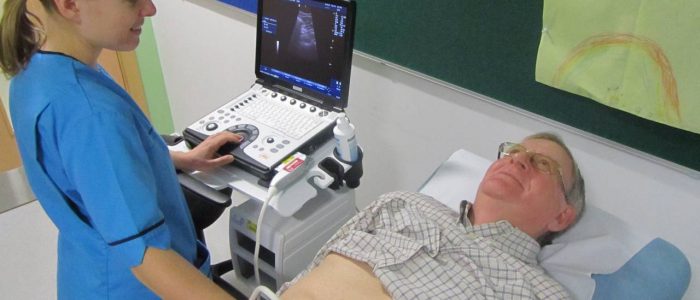New Male Only Screening Programme is a Success
Almost 3,000 men in Forth Valley, representing 83% of those invited, have taken up the offer of a male-only scan which could help save their life. The abdominal aortic aneurism (AAA) screening programme, which began a year ago, has resulted in five men being referred for vascular surgery and 39 undergoing regular monitoring.
Since October 2013, men aged 65 across Forth Valley have been invited to weekly screening sessions in community hospitals in Falkirk, Stirling and Clackmannanshire as part of a rolling programme across the area.
Over the last year 1,555 men from Falkirk, 965 men attended from Stirling and 369 from Clackmannanshire attended for AAA screening. The vast majority of scans results were normal however the programme identified 39 men who have been invited back for more regular monitoring (six on a three monthly basis and 33 on a yearly basis). Larger aneurisms were identified in five men who were referred for surgery.
The uptake rate of 83% has been described as extremely encouraging by Sandra Robertson, NHS Forth Valley’s Radiology Department Manager. She explained: “The response in Forth Valley has been really good over the last year however we want to make sure this continues which is why we are encouraging all men who receive an invite over the next year to make sure they attend their local hospital for screening.
This screening test is simple, quick and pain-free. It is carried out using an ultrasound scan and the results are available instantly.”
An Abdominal Aortic Aneurysm forms when the aorta, the main artery that supplies blood to the body from the heart, becomes weak and balloons out. As the wall of the aorta stretches, it becomes weaker, and could rupture. If the aneurysm does rupture, it can cause life-threatening internal bleeding which, in 8 out of 10 cases, can prove fatal.
It is estimated that about one in 20 men in Scotland have an Abdominal Aortic Aneurysm, however most are unaware that they have the condition as many only experience pain when the aneurysm ruptures.
Small or medium aneurysms rarely cause trouble, however, it is still important to identify them so that they can be monitored in case they grow bigger. Anyone found to have a large aneurysm is normally referred for surgical treatment. Younger men are not considered to be at risk of an aneurysm so they are not included in the national screening programme. Men aged over 65 who have never been for AAA screening can refer themselves for a screening appointment by contacting NHS inform on 0800 22 44 88.
Around 95% of men are expected to have a normal scan and will exit the screening programme. This is because the chance of a normal aorta developing an aneurysm is extremely rare.





